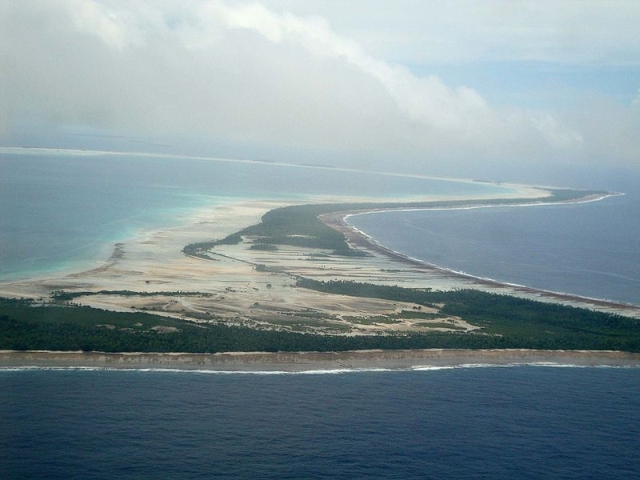Climate Change Imperils Future of Several Nations

Dozens of poor nations are threatened by flooding, rising sea levels, crop loss, and the ravaging effects of coastal storms
By Beth Rowen
While climate-change skeptics continue to question the scientific evidence proving that global warming is real and human activity has contributed to the crisis, residents of several low-lying coastal and island nations have no doubt whatsoever. Indeed, climate change poses an imminent threat to their very livelihood and existence. The nations most vulnerable to climate change are threatened by flooding, rising sea levels, crop loss, and the ravaging effects of coastal storms. These countries face the added curse of being poor and therefore lack the infrastructure to protect their residents. Maplecroft, a British risk analysis firm, published the Climate Change Vulnerability Index in 2014. The report ranked 30 countries at "extreme risk" to the effects of climate change. The top ten countries are: Bangladesh, Guinea-Bissau, Sierra Leone,Haiti, South Sudan, Nigeria, Democratic Republic of Congo, Cambodia, Philippines, and Ethiopia. At-Risk Nations Gather and Take Initiative to Adapt to Climate ChangeIn 2009, leaders from Kiribati, Bangladesh, and the Maldives organized the first Climate Vulnerable Forum to raise awareness about the issue, stress the urgency for action, and to develop an action plan. Representatives from Barbados, Bhutan, Ghana, Kenya, Nepal, Rwanda, Tanzania, and Vietnam also attended. Their statement called on industrialized nations that emit a bulk of the world's greenhouse gases to clean up their act. But CVF participants did not simply cast blame on bigger and richer countries-they vowed to lead by example and become carbon neutral. The CVF met in Dhaka, Bangladesh, in November 2011 and in 2014 in Costa Rica. Membership has increased to 20 participating countries: Afghanistan, Bangladesh, Barbados, Bhutan, Costa Rica, Ethiopia, Ghana, Kenya, Kiribati, Madagascar, Maldives, Nepal, Philippines, Rwanda, Saint Lucia, Tanzania, Timor-Leste, Tuvalu, Vanuatu and Vietnam. Kiribati Prepares to Relocate CitizensThese nations must begin to adapt to climate change as they wait for help from the international community, otherwise they may cease to exist. For example, Kiribati consists of 32 low-lying islands that are only about 10 feet above sea level and a mere 1.2 miles wide, leaving little room for residents to retreat from the eroding shoreline. A rise in temperatures, drought, and the attendant depletion of freshwater has put a strain on the economy and the well-being of residents. Costs associated with the effects of climate change could run as high as 34% of GDP in the coming decades. Scientific models suggest that Kiribati may become uninhabitable by 2050 if measures are not taken to adapt to the effects of climate change. President Anote Tong has reached out to Fiji, New Zealand, and Australia, asking them to accept Kiribati residents—"climate refugees." As part of a plan for "migration with dignity," President Tong finalized the purchase of 6,000 acres on the Fiji island of Vanua Levu for more than $8 million during the summer of 2014. Kiribati has embarked on an ambitious multi-phase adaptation plan that it hopes will avoid the relocation of its inhabitants. The plan involves assessing potential risks and areas of most vulnerability, improving infrastructure to prevent floods, developing a plan to improve the management of water supplies and prevent deforestation and coastal erosion, and managing population settlement. United Nations Has Addressed Threat of Climate Change Since 1990sMany of these at-risk nations have appealed to the international community for help. At the UN General Assembly in September 2011, Vanuatu prime minister Meltek Sato Kilman Livtuvanu called on "leaders of advanced nations to renew and honor their pledges to finance efforts to assist most vulnerable communities address their adaptation needs to ensure island nations survive the impending global disaster climate change may afford." Livtuvanu was one of several leaders to issue such a plea. The United Nations Framework Convention on Climate Change treaty was adopted in 1992 to "limit average global temperature increases and the resulting climate change and to cope with whatever impacts" arise from climate change. The UNFCCC holds annual meetings and has produced the Kyoto Protocol, Copenhagen Accord, the Cancun Agreement, and the Durban Platform for Advanced Action. At the 2009 Copenhagen meeting, developed nations pledged some $100 billion to help developing nations switch to more efficient, less polluting sources of energy and to help them battle climate change and its effects. The accord was non-binding, however, and therefore considered quite weak. The 2010 Cancun Agreement created the $100 billion fund and said developed nations would commit to limiting global temperature increases to 2 degrees, reduce greenhouse gas emissions by 25% to 40% by 2020, and would "assist the particularly vulnerable people in the world to adapt to the inevitable impacts of climate change." The Durban Platform of 2011 established the Green Climate Fund to help developing nations adopt cleaner sources of energy and adapt to the results of climate change. Developing nations have criticized these protocols and agreements as inadequate and are skeptical that industrialized nations will make good on their promises. Rather than stand by, many of these nations are moving quickly to adapt to climate change and taking necessary steps to protect their residents. World leaders are taking note. At the landmark 2015 United Nations Climate Change Conference held in Paris, France, the CVF successfully lobbied to limit global warming to a temperature increase of 1.5 degrees Celsius above pre-industrial levels, from a proposed 2 degrees Celsius. "Climate change does not affect us equally. Those countries which have contributed least to the problem are often affected the most," said Kare Chawicha, Ethiopia State Minister of Environment, Forest and Climate Change. "We are here to cooperate. We are here to share experiences. Even if we contribute the least and suffer the most, we do not sit idle.â |
| More on Earth Day |

